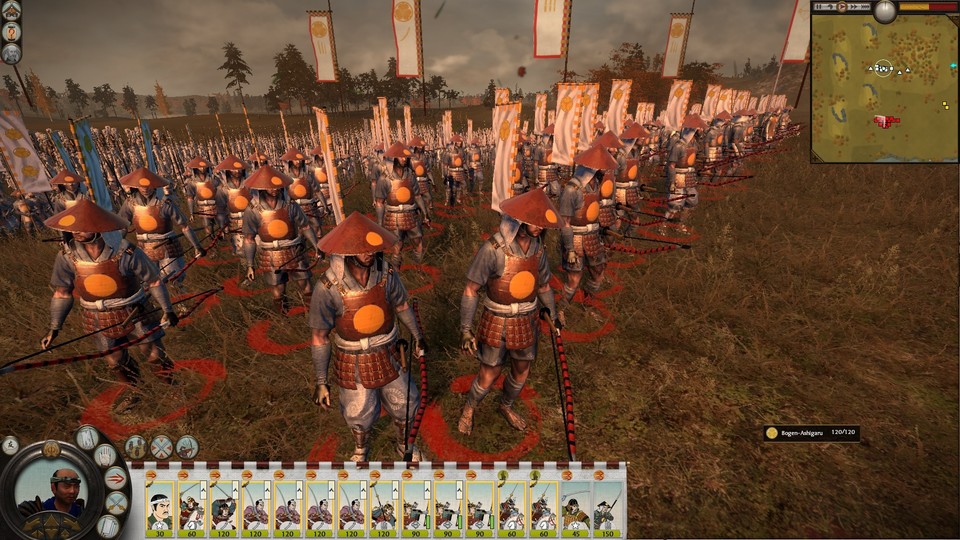The artificial intelligence has always been a problem in the Total War series, whether in Medieval, Rome, Empireor Shogun-- over and over again the fans complained about heavy AI bugs destroying the fun. We talked with Scott Pitkethly, programmer of the battle AI in Shogun 2. Cause in this game the AI does stupid things again. What are the reasons?
GameStar: Scott, have you ever been annoyed by the AI in Total War?
Scott: I think our AI does a very good job in trying to play the game. We worked much to gear our AI to play the game in a fun way, which is actually quite different from trying to make an AI, which plays the game in the best way. There are times when the AI may not always do what you are expecting or what you think it would do, but that is the way we constructed it. We could make our AI a very competitive opponent, it could outthink a player. It could do twenty actions every second. So we constantly tried to balance this: making it fun and engaging versus making the best decision.

GameStar: So would you say this ›allowing the player to grow‹ is a good AI for a strategy game?
Scott: »I think the player always needs to feel challenged. I want the player to always feel like the reason he is winning the game is because he is amazing at the game. So we want to make the AI look like it is doing clever things. On the battle map we wanted the AI to be outflanking or enveloping the player. But also we want to give the player the ability to play well. He needs to have the option open to him to play in a certain way, otherwise there is no game.«
GameStar: What are the challenges creating an AI for a really complex strategy game?
Scott: The real problem is that the problem space we are dealing with is immense. In Shogun 2 we have got three worlds. Essentially we have got the campaign map. We have land battles with different battle modes like river battles and siege battles and we have got naval battles. Also it is not a grid based game. Essentially every piece, be it a unit or a ship, in the campaigns map has almost an infinity number of thing that it can decide to do. I can not think of any other game that does quite the same thing. I mean you could see similarities between Civilizations and our campaign map, but then we have got our battle map on top of that. The two have to reinforce each other.
GameStar: Is this the main difference between the first Shogun and Shogun 2?
Scott: Definitely. In Shogun 1 the campaign map was very much like a board game, so it was very much like risk. Your problem space is much more defined, you have got your map, you have got only several places where pieces can be. In Shogun 2 when you are growing out to something which is a huge map that is totally continuous man can be anywhere and do a huge array of things in numerous places. And where they do it makes a big difference. So there are so many options that go from quite restricted to infinity really.«
GameStar: In Total War history the AI always has been a source of criticism. Why is that?
Scott: Yes, there are times when the AI would do something which we would not necessary wanted it to do. But if you see it makes a mistake halfway through a campaign turn or a battle: that is one bad decision it makes. It has probably made half a million decisions up to that point. But you do not even notice, because that is just the AI running and you will only notice very quickly when one thing goes wrong. That is human nature, I guess. But that is the point, that it is very difficult and we have really great programmers working on it.
GameStar: Would you say this is also a manpower problem, if you had thirty programmers would it be easier to do it?
Scott: No, this is a common misconception in IT generally: That the more people you throw at something the better the results is going to be. In reality it does not work like that.













Nur angemeldete Benutzer können kommentieren und bewerten.
Dein Kommentar wurde nicht gespeichert. Dies kann folgende Ursachen haben:
1. Der Kommentar ist länger als 4000 Zeichen.
2. Du hast versucht, einen Kommentar innerhalb der 10-Sekunden-Schreibsperre zu senden.
3. Dein Kommentar wurde als Spam identifiziert. Bitte beachte unsere Richtlinien zum Erstellen von Kommentaren.
4. Du verfügst nicht über die nötigen Schreibrechte bzw. wurdest gebannt.
Bei Fragen oder Problemen nutze bitte das Kontakt-Formular.
Nur angemeldete Benutzer können kommentieren und bewerten.
Nur angemeldete Plus-Mitglieder können Plus-Inhalte kommentieren und bewerten.